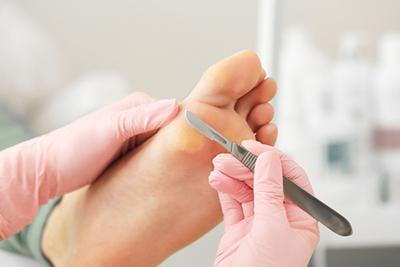
Address your persistent corns in Asheville, NC, by seeking expert assistance from Dr. Daniel Waldman of Blue Ridge Foot Centers.
What Are Corns?
Excess pressure on your feet can cause various issues. Those issues may include bunions, hammertoes, and ingrown toenails. Corns may also form as a result of subjecting your feet to excessive and continuous pressure.
Many folks who have corns may not even realize it. That’s likely because they are referring to the corns on their feet as calluses. While it’s easy to understand why people may confuse corns and calluses, there are notable differences that can help you tell them apart.
The biggest difference between corns and calluses is how they feel. You won’t feel anything even if something is touching your calluses. On the other hand, corns can be painful when they are exposed to pressure.
Corns are also more likely to form along the top and sides of your toes. They usually emerge on the parts of the foot that are subjected to excessive pressure and friction. Calluses form on the parts of your feet that are exposed to frequent contact. You may see them develop on your heels or the balls of your feet.
You can also group corns into one of three categories. Those categories include hard, soft, and seed corns. Hard corns are thick growths, while soft corns are comparatively thinner bumps. Seed corns are considerably smaller than both their hard and soft counterparts.
Unfortunately, corns can do more than cause pain. Depending on where they grow, those corns can also prevent you from wearing shoes or walking comfortably.
Work with Dr. Waldman of Blue Ridge Foot Centers so you can receive effective treatment for your persistent corns in Asheville, NC.
What Can a Podiatrist Do for Your Corns?
The treatment a podiatrist offers for corns will depend on the nature of the growths and their severity.
Your podiatrist may tell you to soak your feet if you have small corns. Once you’re done soaking your feet, they may advise you to trim the corn using a nail file. Podiatrists can also trim corns using scalpels.
Treatment for corns may also include changes to your footwear. Your podiatrist may advise you to wear new shoes that don’t crowd your feet. They can also prescribe orthotics if only certain parts of your feet are affected by the excessive pressure.
Surgery is a potential option for treating corns. Generally speaking, podiatrists will only use surgery if your corns are related to structural issues that can only be corrected through surgery.
Get the solution you need for your corns in Asheville, NC, by calling (828) 254-5371 and speaking to Dr. Waldman of Blue Ridge Foot Centers.
